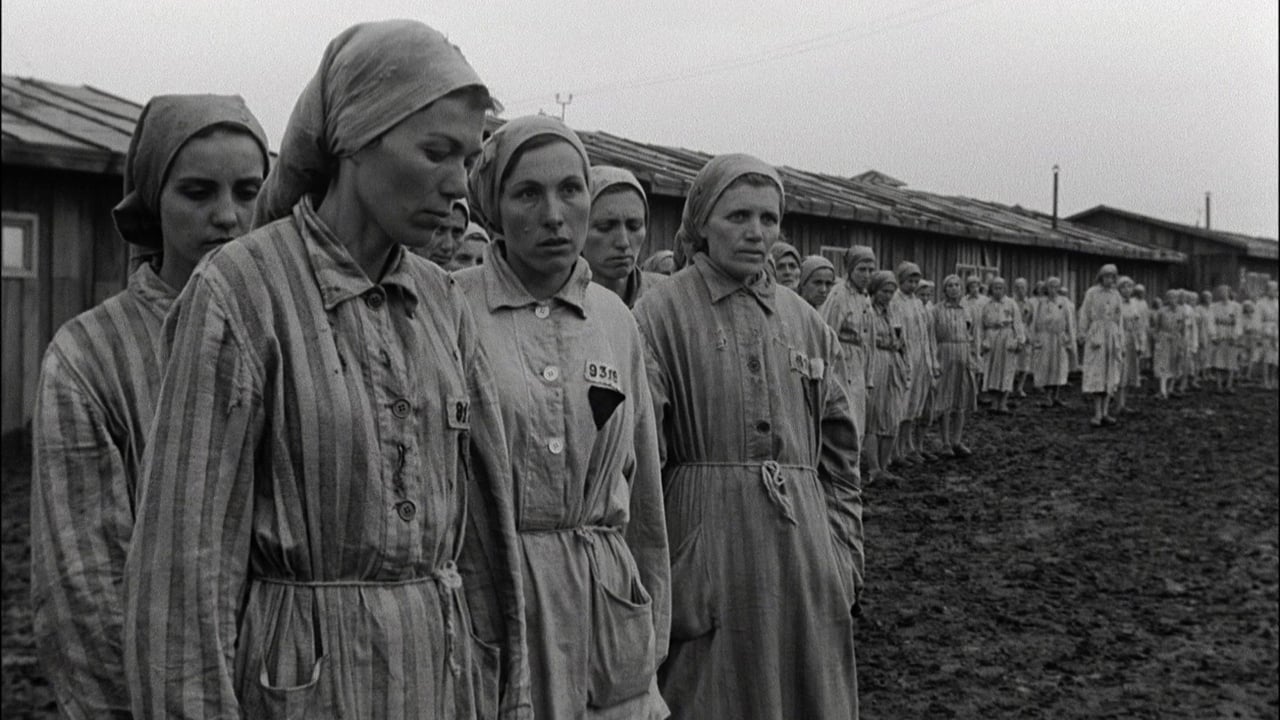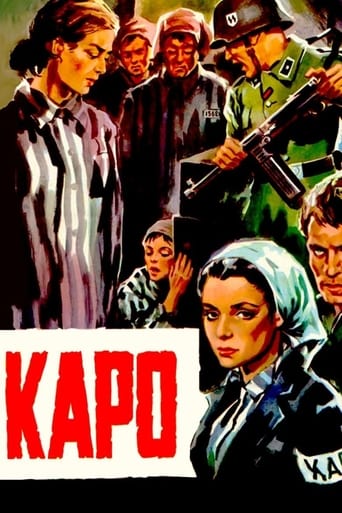

Kapo is a word for Nazi concentration camp inmates who were deputized to keep an eye on their fellow prisoners and report back to the officers. In exchange, they received special treatment and favors.In this 1960 Academy Award nominee for Best Foreign Language Film, Susan Strasberg gives a fierce performance as a Kapo in one such camp. We watch her evolve from terrified young girl into ruthless authority figure out of a desperate sense of survival. We then see her undergo a crisis of conscience as the inmates plan an escape. Does she help them or report them?In the story of this one young woman is a broader examination of what drove millions of Germans to either support the Nazis or turn a blind eye to their atrocities. It's a cautionary tale about how far the extinct for survival will push one human being to disregard the life of another. Gillo Pontecorvo, who would direct one of the best films of the 1960s a few years later ("The Battle of Algiers"), allows a bit more sentiment and melodrama to drive this story than he does that later picture, but it's still a bracing and haunting film. For the record, this is the first time I saw Emanuelle Riva as a much younger actress (or at least the first time when I knew who she was), and she's stunning.Grade: A
... View MoreNominated for an Academy Award for Best Foreign Film in 1960, Gillo Pontecorvo's second film Kapo features Susan Strasberg as a Holocaust victim who decides that she will do anything to survive, even join the enemy. Kapo, which stands for Kameradenpolizei, refers to death camp collaborators who are recruited from the "criminal element" to supervise other prisoners in return for better treatment and more privileges. Pontecorvo, who fought in the Italian Resistance as a member of the Communist Party, presents a realistic picture of what life in a concentration camp must have been like but no movie can fully capture the madness and inevitably any attempt to dramatize it must take on aspects of melodrama.Strasberg, who had played the title role in The Diary of Anne Frank on Broadway several years earlier, portrays Edith, a 14-year old Jewish girl who is sent to a concentration camp with her parents when Jews are rounded up in Paris. After watching her parents die in the gas chambers along with other women and children, Sofia, a friend, introduces Edith to the camp doctor who provides her with a new identity as the non-Jewish Nicole. Cutting her hair and dressing her in the work clothes of a prisoner that died that morning, she is sent to a labor camp where she witnesses repeated horrors including the hanging of a young girl for alleged sabotage.Desperate to stay alive, she offers herself to a German soldier Karl (Gianni Garko). Although little about this relationship is developed, it leads to Nicole accepting the job of a Kapo, and the victim becoming a victimizer, brutally enforcing the camp's harsh rules on her fellow prisoners. It is only when she witnesses the suicide of a close friend Terese (Emanuelle Riva) and falls in love with Sascha (Laurent Terzieff), a Russian prisoner of war, that she is able to redeem the human values that had once been an integral part of her life. Much of this happens over a period of time but the passage of time is not shown and Nicole's transformation from a loving young girl to a bullying camp guard seems too quick and facile to be truly convincing, and there is little self-reflection in the process. The experience gained in this film, however, paved the way for Pontecorvo's masterpiece The Battle of Algiers, only a few years after.
... View MoreThe first third of "Kapo" is powerful and affecting. The rest, despite the surface realism, borders on the ludicrous.I doubt that any filmmaker can create a fictional movie that thoroughly encompasses the Holocaust, because it was experienced by such a diverse group of people. In "Kapo," director Gillo Pontecorvo tries earnestly to tell the story of a French teenager who, separated from her Jewish parents, determines that she will survive no matter what. Edith (Susan Strasberg) assumes the guise of "Nicole," a non-Jewish political prisoner who escapes the gas chamber and finds refuge in a group of other female prisoners assigned to a labor camp, where the Nazis essentially work the inmates to death rather than exterminate them outright.Surviving the labor camp ultimately means becoming a ruthless stooge of the Nazis, and Edith/Nicole's descent into inhumanity is believable, up to a point. She becomes a thief, then a whore for the SS guards, and finally a brutal "Kapo," a privileged prisoner who supervises the other inmates. However, the transition accelerates to a point that the viewer is left wondering just how quickly it is occurring, and just how Edith/Nicole can shed her last shreds of sympathy and compassion for the other prisoners. She enters into a odd friendship with one of the German SS guards (Gianni Garko), but that interesting development is pursued only a little.Instead, a hunky Russian soldier, Sascha (Laurent Terzieff), arrives with a POW work detail, and, after almost getting him killed by the Germans, "Nicole" falls in love with him -- and "Kapo" starts to tread into Hollywood (or Cinecitta) silliness. (Falling in love with a soldier of the Red Army, rather than with an SS man, would have much more politically correct in 1959 Italy). Nicole's reverse transition from the amoral Kapo to a smitten adolescent, and the love scenes between Strasberg and Terzieff, are simply not believable in the context of what is seen earlier in the film. I suppose the filmmakers would argue that the love affair between "Nicole" and the Russian soldier was necessary to set up the final plot sequence: as the victorious Red Army approaches their camp, the female prisoners and Russian POWs plot a mass escape to forestall their massacre by the fleeing German guards. The denouement of "Kapo" is, perhaps, visually realistic, but it doesn't really mesh with the story of Edith/Nicole that emerges in the early part of the film.That first 25 or 30 minutes of "Kapo" are powerful and wrenching, as Edith is torn away (seemingly with no warning) from what appears to have been a relatively comfortable, middle-class existence in Paris (as comfortable as it could have been for French Jews in 1942-43) and transported to what we quickly recognize as Auschwitz. In a matter of minutes, Edith is plunged into near-surreal terror and then stripped of her old identity in order to survive as "Nicole." It is a sequence that promises much, which is why I found the rest of the film such a disappointment.I will not profess expert knowledge of the Holocaust, and perhaps the story told in "Kapo" could have happened. Pontecorvo and co-writer Franco Solinas did extensive research, and "Kapo" certainly has visual authenticity compared with various documentaries I've seen on the subject. Strasberg is effective in her role as Edith/Nicole; the other actors are credible given the roles they have to occupy. There is a noticeable problem with language; the film is in Italian, which the various nationalities represented among the camp inmates all seem to speak fluently and interchangeably; but a key scene involves an inmate translating the camp commandant's speech from German into -- Italian? How many Italian speakers would have been in such a camp? "Kapo," however, ultimately founders on the unbelievable relationship between "Nicole" and Sascha that dominates the second half. I just couldn't buy it.
... View MoreOnly the survivors of the Holocaust can tell us what the concentration camp experience was really like, but Kapo is probably as close as cinema can get to recreating the numbing horrors of the camps--and that includes Schindler's List. Susan Strasberg is superb as Edith, the Jewish teenager who is saved by chance and then becomes a collaborator in order to survive. The film's greatest strength is its ability to make us comprehend the forces that compelled inmates to become kapos--the Nazi equivalent of prison trustees--and almost (but not quite) makes us sympathize with them. Snatched from the jaws of the gas chamber only to have the power of life and death thrust upon them, the kapos did what they had to do in order to survive--and who amongst us would not take that same chance if thrust into the heart of Nazi darkness. This incredibly powerful film is filled with astonishing imagery, none more powerful than the scene of Edith/Nicole watching helplessly as her parents are forced to jog to their demise amidst a crowd of children and elderly inmates--people who are inessential to the Reich's war machine. This important film, long forgotten in the United States, has now been unearthed by Turner Classic Movies, and hopefully a DVD is not far behind.
... View More